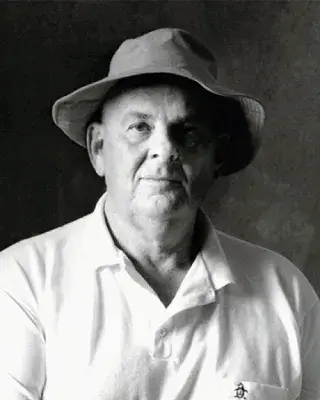Biography of Les Murray

| date | place | |
|---|---|---|
| born | October 17, 1938 | Nabiac, Australia |
| died | April 29, 2024 | Taree, Australia |
Les Murray, born Leslie Allan Murray on October 17, 1938, in Nabiac, a rural district of New South Wales, Australia, and raised in the nearby farming community of Bunyah, emerged as one of Australia's leading poets, distinguished by his deep engagement with the country's landscape, language, and cultural identity. His upbringing in a dairy farming family amidst the lush, challenging terrains of Bunyah deeply ingrained in him an affinity for the natural world, a theme that pervades much of his poetry. This rural backdrop, coupled with personal struggles, including the tragic loss of his mother when he was just 12, shaped his perspective and poetic voice, infusing his work with a sense of loss, resilience, and a profound connection to the land. Murray's academic journey took him to the University of Sydney, where he studied modern languages, a pursuit that broadened his literary horizons and honed his linguistic skills. His university years were also marked by personal challenges, including bouts of depression, which he later addressed in his poetry. Despite these difficulties, Murray's time at university was pivotal, introducing him to the wider world of literature and ideas, and helping to cultivate his future as a poet. Throughout his prolific career, Murray published more than 30 volumes of poetry, notable for their linguistic inventiveness, use of Australian colloquialisms, and exploration of a wide array of themes. His work is celebrated for its accessibility, depth, and the unique blend of humor and gravitas, often drawing on his personal experiences to explore broader social, political, and spiritual themes. Murray's poetry is characterized by its versatility, ranging from the pastoral and bucolic to the contemplative and introspective, all the while remaining deeply rooted in the Australian experience. Among his most acclaimed works is "Subhuman Redneck Poems" (1996), a collection that earned him the T.S. Eliot Prize and showcased his ability to navigate complex themes with wit, empathy, and insight. This work, like much of his poetry, reflects Murray's talent for capturing the Australian vernacular and spirit, making profound observations on human nature and society's margins. Murray's contributions to literature were not limited to his poetry. He was also a respected critic and anthologist, championing Australian literature and offering insightful critiques of contemporary poetry. His editorial work, including his role with the "Fivefingers Review," further cemented his position as a central figure in Australia's literary community. His honors include the Queen's Gold Medal for Poetry (1999) and the Christopher Brennan Award, recognizing his lifetime achievement in poetry and his significant contribution to Australian letters. Murray's influence extends beyond Australia, with his work being translated into several languages, affirming his place as a significant voice in world literature. Les Murray passed away on April 29, 2019, leaving behind a rich legacy that continues to influence and inspire. His poetry, marked by its depth, diversity, and distinct Australian character, remains a vital part of the literary landscape, offering readers around the world insight into the human condition, the beauty and complexity of the natural world, and the unique nuances of Australian life and identity. Through his work, Murray not only captured the essence of Australia but also explored universal themes, making him a poignant and enduring figure in global literature. Les Murray's poetry stands as a monumental contribution to the literary world, capturing the essence of the Australian landscape, culture, and identity through his masterful use of language and form. The poems of Les Murray are celebrated for their rich imagery, emotional depth, and the unique ability to weave the colloquial vernacular into the fabric of his verse, making his works not only a reflection of the Australian spirit but also a window into the complexities of human nature and the universal themes of belonging, loss, and joy.
Feel free to be first to leave comment.